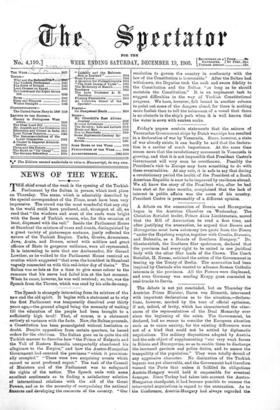The debate is not yet concluded, but on Thursday the
Austrian Prime Minister, Baron von Bienerth, intervened with important declarations as to the situation,—declara- lions, however, marked by the tone of official optimism, if not, indeed, of levity, which has characterised the utter- ances of the representatives of the Dual Monarchy ever since the beginning of the crisis. The Government, he declared, had no reason to consider the European situation such as to cause anxiety, for the existing differences were not of a kind that could not be settled by diplomatic negotiations. The military dispositions adopted by Austria had the sole object of supplementing "our very weak forces in /Mania and Herzegovina, so as to enable them to discharge the increased garrison and police duties, and to assure the tranquillity of the population." They were totally devoid of any aggressive character. No diminution of the Turkish boycott was yet observable, and the Government had therefore warned the Porte that unless it fulfilled its obligations Austria-Hungary would hold it responsible for eventual damages. Since Turkey had taken into account the Austro- Hungarian standpoint, it had become possible to resume the interrupted negotiations in regard to the annexation. As to the Conference, Austria-Hungary had always regarded the
idea with sympathy, nay, she even considered the meeting of the Conference to be positively desirable. Her only condition was that a complete agreement concerning the tasks of the Conference should be previously attained between the Powers.















































 Previous page
Previous page